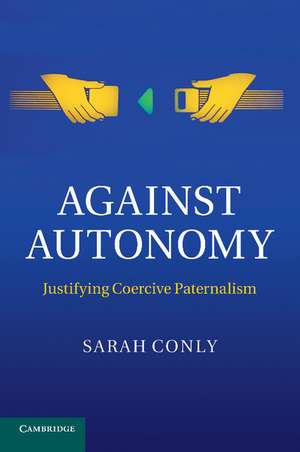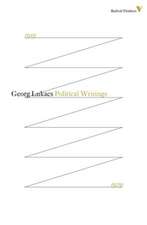Against Autonomy: Justifying Coercive Paternalism
Autor Sarah Conlyen Limba Engleză Paperback – 11 sep 2013
| Toate formatele și edițiile | Preț | Express |
|---|---|---|
| Paperback (1) | 220.42 lei 6-8 săpt. | |
| Cambridge University Press – 11 sep 2013 | 220.42 lei 6-8 săpt. | |
| Hardback (1) | 692.50 lei 6-8 săpt. | |
| Cambridge University Press – 7 noi 2012 | 692.50 lei 6-8 săpt. |
Preț: 220.42 lei
Nou
Puncte Express: 331
Preț estimativ în valută:
42.18€ • 43.88$ • 34.82£
42.18€ • 43.88$ • 34.82£
Carte tipărită la comandă
Livrare economică 15-29 aprilie
Preluare comenzi: 021 569.72.76
Specificații
ISBN-13: 9781107649729
ISBN-10: 1107649722
Pagini: 216
Ilustrații: black & white illustrations
Dimensiuni: 152 x 229 x 15 mm
Greutate: 0.32 kg
Editura: Cambridge University Press
Colecția Cambridge University Press
Locul publicării:New York, United States
ISBN-10: 1107649722
Pagini: 216
Ilustrații: black & white illustrations
Dimensiuni: 152 x 229 x 15 mm
Greutate: 0.32 kg
Editura: Cambridge University Press
Colecția Cambridge University Press
Locul publicării:New York, United States
Cuprins
Introduction; 1. Why value autonomy?; 2. Individuality; 3. Alienation, authenticity, and affect; 4. Misuse and abuse: perfectionism and preferences; 5. Misuse and abuse: punishment and privacy; 6. Applications; 7. Final justifications.
Recenzii
'Sarah Conly's Against Autonomy is a bold and rigorous work, which seeks to demolish liberal defenses of rights and the value often believed to underlie them. I expect it to become a canonical consequentialist defense of paternalism. It is also a book with which all political and moral philosophers will have to contend, especially those who seek to resist its central thesis.' Corey Brettschneider, Brown University
'Sarah Conly has written the best book about paternalism since Mill, and the best philosophical defense of paternalism we have to date. Tough-minded, resourceful, precise, and informed by knowledge of both psychology and the regulatory state, the book issues a challenge to which, from now on, anyone who objects to paternalistic government policies will have to respond. A marvelous achievement.' Martha Nussbaum, Ernst Freund Distinguished Service Professor of Law and Ethics, University of Chicago
'According to Mill, 'Over himself, over his own body and mind, the individual is sovereign.' Sarah Conly disagrees. In this lively, accessible, sensible, and well argued book, Conly makes a case for coercive paternalism that critics of the 'nanny state' will have to take seriously.' Alan Wertheimer, Professor Emeritus, University of Vermont
'For generations paternalism has had a bad odor, and individual autonomy has reigned supreme. Sarah Conly's book will change all of that. She argues in favor of paternalism with rigor and gusto, and persuasively shows how shedding our reflexive aversion to paternalism will make people better off. Some will be persuaded and others not, but this book will forever change the nature of the debates about paternalism, autonomy, and the role of the state in individual well-being.' Frederick Schauer, University of Virginia
'This volume … is a thought-provoking contribution (in every sense of the word provoking) both to general practical philosophy and to biomedical ethics in particular. [This book] should be studied by everyone who is interested in defending autonomy and liberty for finite human beings.' Michael Quante, Medicine, Health Care and Philosophy
'Until now, we have lacked a serious philosophical discussion of whether and how recent behavioral findings undermine Mill's harm principle and thus open the way toward paternalism. Sarah Conly's illuminating book Against Autonomy provides such a discussion.' Cass R. Sunstein, New York Review of Books
'… usefully illuminates the moral-ethical complexities and risks of community-based lawyering for pro bono attorneys who stand up in defense of impoverished communities.' Michigan Law Review
'Sarah Conly has written the best book about paternalism since Mill, and the best philosophical defense of paternalism we have to date. Tough-minded, resourceful, precise, and informed by knowledge of both psychology and the regulatory state, the book issues a challenge to which, from now on, anyone who objects to paternalistic government policies will have to respond. A marvelous achievement.' Martha Nussbaum, Ernst Freund Distinguished Service Professor of Law and Ethics, University of Chicago
'According to Mill, 'Over himself, over his own body and mind, the individual is sovereign.' Sarah Conly disagrees. In this lively, accessible, sensible, and well argued book, Conly makes a case for coercive paternalism that critics of the 'nanny state' will have to take seriously.' Alan Wertheimer, Professor Emeritus, University of Vermont
'For generations paternalism has had a bad odor, and individual autonomy has reigned supreme. Sarah Conly's book will change all of that. She argues in favor of paternalism with rigor and gusto, and persuasively shows how shedding our reflexive aversion to paternalism will make people better off. Some will be persuaded and others not, but this book will forever change the nature of the debates about paternalism, autonomy, and the role of the state in individual well-being.' Frederick Schauer, University of Virginia
'This volume … is a thought-provoking contribution (in every sense of the word provoking) both to general practical philosophy and to biomedical ethics in particular. [This book] should be studied by everyone who is interested in defending autonomy and liberty for finite human beings.' Michael Quante, Medicine, Health Care and Philosophy
'Until now, we have lacked a serious philosophical discussion of whether and how recent behavioral findings undermine Mill's harm principle and thus open the way toward paternalism. Sarah Conly's illuminating book Against Autonomy provides such a discussion.' Cass R. Sunstein, New York Review of Books
'… usefully illuminates the moral-ethical complexities and risks of community-based lawyering for pro bono attorneys who stand up in defense of impoverished communities.' Michigan Law Review
Notă biografică
Descriere
Argues that laws that enforce what is good for the individual's well-being, or hinder what is bad, are morally justified.
















